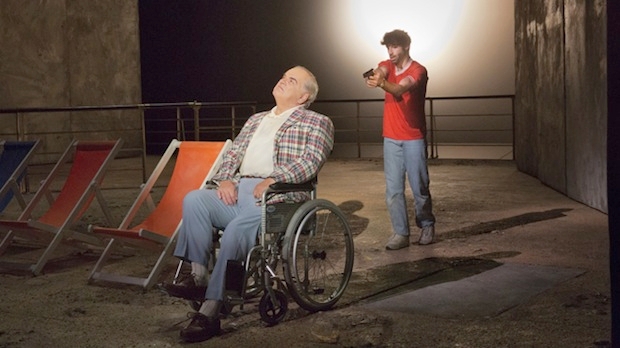My father’s house was razed
In 1948
When the Israelis passed
over our street
I’ve never forgotten the opening lines to John Adam’s 1991 opera, The Death of Klinghoffer. Crisp, elegiac, this ‘Chorus of Exiled Palestinians’ rises up to a moment of anguished dissonance as it spits out the word ‘Israelis’. It’s beautiful. It’s also the most egregious romanticisation of Palestinian terrorism outside the muralled bunkers of the Gaza Strip.
In the Metropolitan Opera’s new production, a chorus of shrouded Palestinian women form a funeral procession as they intone their complaint, eventually parting to reveal a 5-year-old boy, cradled in the arms of his weeping, widowed mother. Marking the start of a libretto deeply versed in biblical codes – lyricist Alice Goodman is an Anglican priest and theologian, born into Judaism – the day ‘when the Israelis passed over our street’ becomes an image of Exodus. It’s a Palestinian appropriation of the Jewish Passover, when the Angel of Death is said to have culled the first-born sons of their Egyptian enemy, but famously ‘passed over’ the houses of Hebrew slaves. The message is clear: each time the Jews escape subjugation, they find a way to make other innocents suffer in turn. I squirmed in my seat.
No wonder the plaza at the Met was crammed with protestors on Monday’s opening night. Even former Mayor Giuliani popped by to warn against rehabilitating violent terrorists (though he curiously forget to mention the day he personally cut the ribbon on Gerry Adams’ NYC fundraising tour in the pre-Good Friday days of 1994.)
Because, who was Klinghoffer? As the title suggests, John Adams opera presents him impersonally, a sacrificial victim, his death the inevitable climax of cosmic struggles. In reality, Leon Klinghoffer was a 69 year old Jewish-American, murdered by Palestinian terrorists when they hijacked an Italian cruise ship in 1985. Contrary to the opera, he was almost certainly killed as much because he was a wheelchair user as because he was a Jew –it proved impossible to transport his chair to the deck on which the hijackers had chosen to hold their prisoners, so they shot him, and ordered the ship’s staff to throw his body and wheelchair overboard. He was an inconvenience to the hijackers, not a subtle, breathing mass of human complexities. Years later, the mastermind of the attack, Abu Abbas, would claim, ‘He was not killed because he was American or a Jew, but because he made a lot of fuss’. If that is a better excuse for murder, we live in a very cold world.
What is clear is that Leon Klinghoffer’s captors had not a scrap of empathy for him as a fellow creature. And it is empathy for these men of violence that Adams, and librettist Alice Goodman, make their central concern. Many, including Klinghoffer’s family, find it hard to swallow. The line between understanding and excusing is a fine one, and Klinghoffer meanders across it drunkenly, though it does some justice to the heart-stopping grief of Klinghoffer’s widow. That said, this hardly makes the staging of it an act of unremitting evil, or an anti-Semitic conspiracy on the part of (of all people) the Metropolitan Opera of New York City.
Instead, the rumpus at the Met feels like a bizarre inversion of London’s equally entrenched battlelines. As my bag was aggressively searched, I remembered the last time I’d known a musical evening require such security: Daniel Barenboim’s concert at the Proms earlier this year. Then, of course, the threat was not from young men in kippas but young men in keffiyehs: even the peacemaker Barenboim, a pariah among hardline Israelis due to his determination to work with Arab musicians, is not safe from the inanities of the powerful campaign for a boycott of all Israeli artists and intellectuals.
Israel’s friends in New York seem only too aware of this transatlantic dichotomy. But that’s what makes their response jaw-droppingly short-sighted. As a lucky Englishwoman, I got to see Klinghoffer because I was in New York this week: if you live near any of the 2,000 screens in 67 countries, which usually screen Met performances, you’re now considered unfit to experience it. Following the first round of protests in June, the international broadcast was scrapped because ‘the live transmission of The Death of Klinghoffer would be inappropriate at this time of rising anti-Semitism, particularly in Europe’. In other words, New Yorkers are sophisticated enough to distinguish between art and incitement to violence, but show an empathetic terrorist to the boneheads in Paris, and you might inflame a pogrom.
There are no pogroms going on in the UK. Jewish life and limb are not under threat. But Jewish and Israeli artistic expression certainly is. This summer, mob violence forced the closure of a harmless Israeli hip hop opera after its first performance at the Edinburgh fringe; the Jerusalem Quartet regularly face disruption during concerts (they now perform only to pre-screened audiences and decline interviews and advance publicity). This is the real crisis. And every Jewish New Yorker on a Met Opera picket line is doing Israeli artists a great disservice by validating this kind of bullying.
After all, you can argue about whether or not, or how far, The Death of Klinghoffer excuses terrorism. Academic Robert Fink does a good job here. My companion thought it politically balanced, I disagreed – but we’re going to keep arguing about it amicably for months. And that, after all, is the mark of healthy debate. And of vital art.






Comments